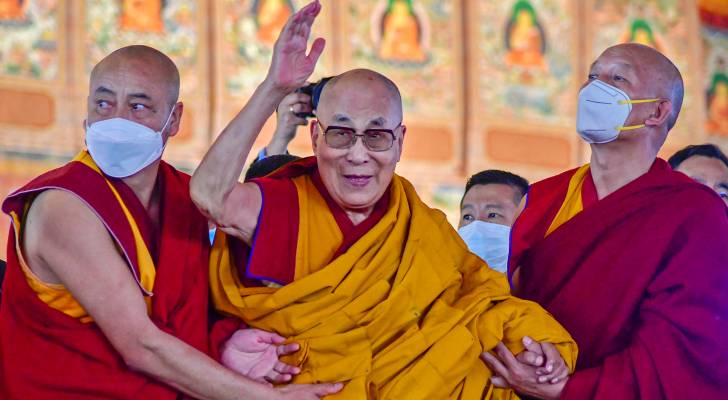Tibetan spiritual leader the Dalai Lama waves at the Kalachakra Ground in Bodhgaya. (December 29, 2022) (Photo: AFP)
Dalai Lama says he will have successor after his death
Exiled Tibetan spiritual leader the Dalai Lama said Wednesday that the 600-year-old institution will continue after his death, a decision that will have profound impact on his Buddhist followers.
It is a landmark decision not only for Tibetans, but also for global supporters who see the Dalai Lama as a symbol of non-violence, compassion and the enduring struggle for Tibetan cultural identity under Chinese rule.
According to Tibetans, he is the 14th reincarnation of the Dalai Lama, and his statement was released ahead of his 90th birthday on July 6.
He said he had received multiple appeals over the past 14 years from Tibetan diaspora in exile, Buddhists from across the Himalayan region, Mongolia and parts of Russia and China, "earnestly requesting that the institution of the Dalai Lama continue".
"In particular, I have received messages through various channels from Tibetans in Tibet making the same appeal," he said in a video broadcast at the start of a meeting of religious leaders in the Indian Himalayan town where he has lived for decades.
"In accordance with all these requests, I am affirming that the institution of the Dalai Lama will continue," he added, according to an official translation.
He and thousands of other Tibetans have lived in exile in India since Chinese troops crushed an uprising in the Tibetan capital Lhasa in 1959.
His advanced age has also sparked concern over the future of Tibetan leadership and the delicate question of his succession.
While China condemns him as a rebel and separatist, the internationally recognised Dalai Lama describes himself as a "simple Buddhist monk".
Many exiled Tibetans fear China will name a successor to bolster control over a territory it poured troops into in 1950.
But the Dalai Lama said Wednesday that responsibility for identifying the 15th Dalai Lama "will rest exclusively" with the India-based Gaden Phodrang Trust, the office of the Dalai Lama.
"I hereby reiterate that the Gaden Phodrang Trust has sole authority to recognise the future reincarnation; no one else has any such authority to interfere in this matter," he added.
China's official stance
According to official Chinese position, the 14th Dalai Lama is not viewed as a spiritual leader but rather as a political figure representing a feudal theocratic regime that ruled Tibet (referred to by China as Xizang) before what Beijing refers to as its liberation in 1951.
Beijing asserts that under his leadership, the region was marked by extreme inequality, with a rigid class structure that oppressed the majority through serfdom and slavery.
The Chinese government says that the Dalai Lama’s opposition to democratic reforms and his alleged separatist activities, backed by Western powers, undermine national unity.
In contrast, Beijing presents modern-day Tibet as a transformed region, citing social progress, economic development, and improved living standards as evidence of its successful governance.




